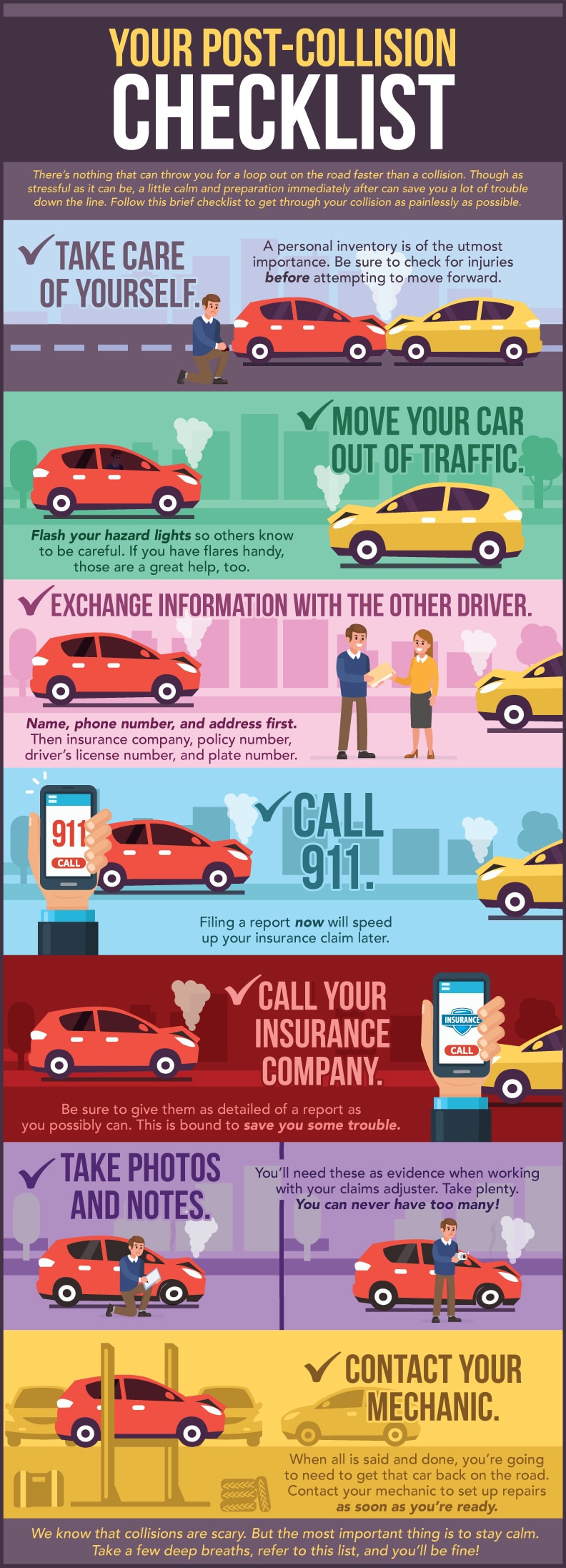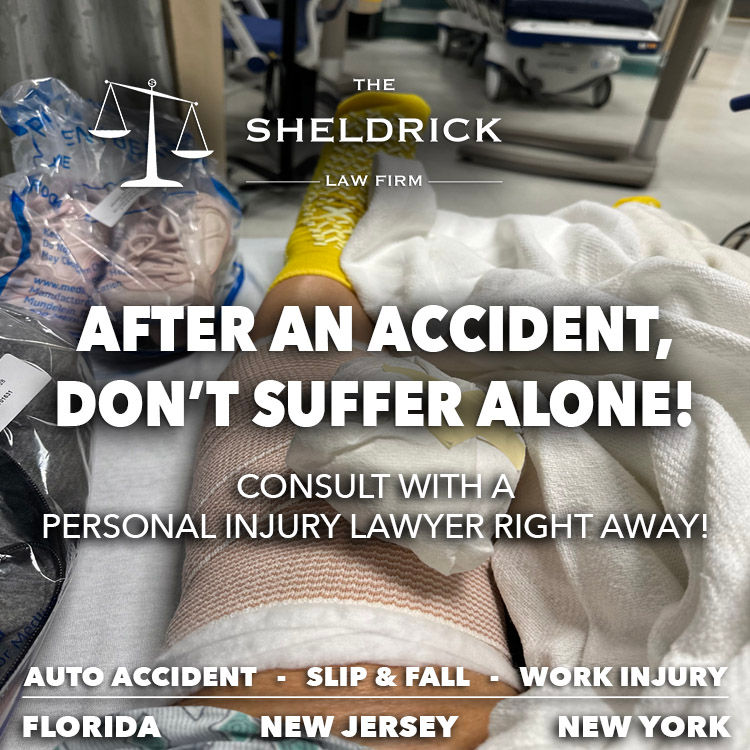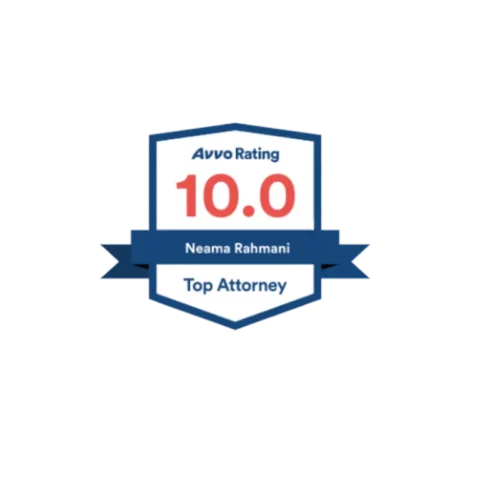If you’re involved in a car accident, it’s important to stay calm and take the following steps:
- Check for injuries. First, check yourself for injuries. If you’re injured, call 911 immediately.
- Move your car to safety. If possible, move your car to the side of the road to avoid further accidents.
- Call the police. Once you’re safe, call the police to report the accident.
- Exchange information. Get the other driver’s name, address, phone number, and insurance information.
- Take photos. If possible, take photos of the accident scene, including the damage to both vehicles.
- Get a copy of the police report. The police report will provide you with a detailed account of the accident.
- Contact your insurance company. You should report the accident to your insurance company as soon as possible.
- Get medical attention. Even if you don’t think you’re injured, it’s important to see a doctor to rule out any hidden injuries.
- Hire an attorney. If you have been seriously injured or if the other driver was at fault, you should consider hiring an attorney to help you get the compensation you deserve.
What to Do After a Car Accident
Being involved in a car accident can be a frightening and confusing experience. In the aftermath of a crash, it’s essential to remain calm and take the necessary steps to protect yourself and others. Here’s a comprehensive guide on what to do if you find yourself in this unfortunate situation.
Pull Over and Check for Injuries
After an accident, it’s crucial to pull over to the side of the road as soon as it’s safe to do so. Check yourself and your passengers for any injuries. Even if you don’t feel pain immediately, adrenaline can mask injuries. It’s always better to err on the side of caution and seek medical attention if you suspect you may have been hurt.
If you’re unable to move your vehicle, remain inside with your seatbelt fastened until help arrives. Turn on your hazard lights to alert other drivers. If possible, use your cell phone to call for assistance or ask a passerby for help.
When checking for injuries, look for signs of bleeding, bruising, swelling, or pain. Pay attention to your head, neck, back, and limbs. If you experience any numbness, tingling, or weakness, seek medical attention immediately.
Remember to stay calm and focused on your safety. Don’t panic, as this can impair your decision-making abilities. Take deep breaths and assess the situation carefully before taking action.
What to Do if You Find Yourself the Unfortunate Victim of a Car Crash
Car accidents are a prevalent and often unnerving occurrence on our roadways. If you ever find yourself the unfortunate victim of a car crash, it’s imperative to act swiftly and decisively. Here’s a comprehensive guide to help you navigate the immediate aftermath of a car accident, ensuring your safety, protecting your rights, and expediting the claims process:
Call the Police
Summoning the police to the scene of the accident is paramount. Their presence serves several crucial purposes. First and foremost, they will document the incident by compiling an accident report. This report will contain essential details such as the names and contact information of the parties involved, the location and time of the crash, and a description of the events leading up to it. Furthermore, the police can assist in directing traffic, preventing further collisions or exacerbating the existing one.
Document the Scene
While waiting for the police to arrive, you should take steps to document the scene of the accident. Use your smartphone to capture photographs of the damage to all vehicles involved, the surrounding area, and any visible injuries. These images will serve as valuable evidence when filing an insurance claim or pursuing legal action. If possible, obtain the names and contact information of any witnesses who may have observed the accident. Their testimony can corroborate your account of events.
Seek Medical Attention
Even if you don’t feel any pain immediately, it’s crucial to seek medical attention as soon as possible. Some injuries, such as whiplash, may not manifest symptoms for several hours or even days after the accident. By seeking medical attention promptly, you can ensure that any injuries are diagnosed and treated appropriately. This will also create a medical record that can be used to support your insurance claim.
Exchange Information
Once the police have arrived and documented the scene, you should exchange information with the other drivers involved in the accident. This includes your name, address, phone number, insurance information, and license numbers. Do not admit fault or discuss the details of the accident with the other drivers. Your insurance company will handle these matters.
Report the Accident to Your Insurance Company
Promptly notify your insurance company about the accident. They will guide you through the claims process and assist you in obtaining compensation for damages to your vehicle and injuries. It’s important to cooperate with your insurance company and provide them with all the necessary information and documentation to facilitate the claims process.
Remember, in the aftermath of a car accident, your safety should be your top priority. By following these steps and seeking professional assistance when necessary, you can protect yourself, your rights, and your health.
What to do if I Was in a Car Accident?
After a car accident, it’s easy to feel overwhelmed and unsure of what to do. Here are some steps to help you navigate this stressful situation:
Exchange Information
The first step is to exchange information with the other drivers involved in the accident. This includes your name, address, phone number, insurance information, and license plate numbers. It’s also helpful to take pictures of the damage to both vehicles and the surrounding area.
Call the Police
If there are any injuries or significant damage to the vehicles, you should call the police. They will create an accident report that can be helpful when filing an insurance claim.
Don’t Admit Fault
Even if you believe you’re at fault for the accident, it’s important to avoid admitting it to the other driver or the police. This could hurt your case later on. Instead, simply state the facts of the accident and let the insurance companies sort out who is responsible.
Seek Medical Attention
Even if you don’t feel injured immediately, it’s important to seek medical attention as soon as possible. Some injuries, such as whiplash, may not show up right away.
Contact Your Insurance Company
After you’ve taken care of your immediate needs, you should contact your insurance company to report the accident. They will guide you through the claims process and help you get your car repaired or replaced.
What to Do If You’re in a Car Accident
If you’ve been in a car accident, it’s important to know what to do next. Here are some steps you can take to protect yourself and your rights.
Stay Calm and Assess the Situation
After an accident, it’s easy to feel shaken up. But it’s important to stay calm and assess the situation. First, check yourself for injuries. Are you bleeding? Do you have any broken bones? Once you’ve checked yourself, check on the other passengers in your vehicle.
If you suspect that you or anyone else has been seriously injured, call 911 immediately. Even if you don’t think you’re hurt, it’s a good idea to get checked out by a doctor as soon as possible.
Move to Safety
If possible, move your vehicle to a safe location. This will help prevent further accidents and make it easier for emergency responders to get to you.
If you’re not able to move your vehicle, stay inside and put on your hazard lights. This will alert other drivers to your presence.
Call the Police
Even if the accident is minor, it’s important to call the police. They will investigate the accident and create a report. This report will be helpful if you need to file an insurance claim.
Exchange Information
Once the police have arrived, exchange information with the other drivers involved in the accident. This includes your name, address, phone number, insurance company, and policy number.
Take Pictures
Take pictures of the accident scene, including the damage to the vehicles and any injuries.
These photos will be helpful for your insurance company and the police. They can also be used as evidence in court if necessary.
Get a Medical Examination
Even if you don’t think you’re hurt, it’s important to get a medical examination after an accident. Some injuries, such as whiplash, may not show up right away. A doctor can check for these injuries and make sure that you’re properly treated.
Contact Your Insurance Company
Contact your insurance company as soon as possible after the accident. They will need to know about the accident so that they can start processing your claim.
Get an Attorney
If you’ve been seriously injured in an accident, you may want to consider getting an attorney. An attorney can help you get the compensation you deserve.
Don’t Say Too Much
After an accident, it’s important to be careful about what you say. Don’t admit fault to the other driver or the police. And don’t sign any documents without talking to your insurance company or an attorney.
Be Prepared to Cooperate
The insurance companies and the police will need to investigate the accident. Be prepared to cooperate with them and provide them with information.
What to Do If I Was in a Car Accident
Been in a car accident? It’s an understatement to say it can be a scary and stressful experience. The aftermath of a car accident can be overwhelming, but it’s important to stay calm and know what to do. Here are some steps to help you navigate the situation and take care of yourself and your passengers:
Get Medical Attention
Experiencing a car accident is enough to send your adrenaline pumping, which may make it difficult to assess the severity of your injuries. Even if you feel okay, it’s essential to seek medical attention as soon as possible. Some injuries, like whiplash, might not show up immediately. A medical professional can thoroughly examine you, rule out any hidden injuries, and provide appropriate treatment.
Pull Over and Check for Injuries
If possible, pull over to the side of the road and check yourself and your passengers for any injuries. If you or someone else is hurt, call for emergency medical services immediately. Time is of the essence in such situations. Even minor injuries should be checked out by a doctor to ensure they don’t worsen over time.
Exchange Information
Once you’ve checked for injuries, exchange information with the other driver(s) involved in the accident. This includes your name, contact information, insurance information, and license numbers. It’s also a good idea to take pictures of the accident scene and any damage to the vehicles. This documentation can be invaluable later on.
Contact the Police
In most cases, you should call the police to report the accident. They will create an official report that can be helpful for insurance purposes and legal proceedings. The police can also help direct traffic and clear the scene if needed.
Take Notes
Taking notes about the accident can help you remember important details later on. Write down everything you can recall, including the time and location of the accident, the names and contact information of any witnesses, the weather conditions, and any other relevant factors. These notes can serve as valuable evidence if you need to file an insurance claim or take legal action.
Report the Accident to Your Insurance Company
As soon as possible, report the accident to your insurance company. They can guide you through the claims process and help you get your vehicle repaired or replaced. It’s important to be honest and accurate when reporting the accident to your insurance company. Any discrepancies in your account could affect your claim.
Seek Legal Advice
In some cases, it may be necessary to seek legal advice after a car accident. If you or someone in your vehicle has suffered serious injuries, or if there is a dispute over who is at fault, an attorney can help you protect your rights and get you the compensation you deserve.
Take Care of Yourself
After a car accident, it’s important to take care of yourself both physically and emotionally. If you’re experiencing any pain or discomfort, don’t hesitate to see a doctor. It’s also important to get plenty of rest and avoid stressful activities. Allow yourself time to heal and process the emotional impact of the accident.
What to Do if You’re in a Car Accident
After a car accident, it’s easy to feel overwhelmed and unsure of what to do next. But taking the right steps can help you protect your rights and get the compensation you deserve. Here’s a step-by-step guide on what to do if you’re in a car accident.
1. Pull Over and Stay Calm
If possible, pull over to the side of the road and turn on your hazard lights. Staying calm will help you think clearly and make the best decisions for your situation.
2. Check for Injuries
First, check yourself for injuries. Then, check your passengers and the other driver(s) involved in the accident. If you or anyone else is injured, call 911 immediately.
3. Call the Police
Even if there are no injuries, it’s important to call the police to report the accident. The police will create an accident report that will be helpful when you file an insurance claim.
4. Exchange Information
Once the police arrive, exchange the following information with the other driver(s) involved in the accident:
5. Take Pictures
If possible, take pictures of the accident scene. This will help you document the damage and provide evidence to your insurance company.
6. Contact Your Insurance Company
As soon as possible after the accident, contact your insurance company to report the accident and file a claim. Your insurance company will assign you a claims adjuster who will investigate the accident and help you get the compensation you deserve.
When you contact your insurance company, be sure to have the following information ready:
Your insurance company will also ask you to provide a statement about the accident. Be sure to be honest and accurate in your statement.
Filing an insurance claim can be a daunting task, but it’s important to remember that your insurance company is there to help you. By following these steps, you can make the process as smooth and stress-free as possible.
What to Do If You’re in a Car Accident
Oh no! You’ve been in a car wreck. Your heart is pounding, your head is spinning, and you’re not sure what to do. Don’t panic! Here’s a step-by-step guide to help you get through this stressful situation.
First things first, stay calm and check yourself and your passengers for injuries. If anyone is hurt, call 911 immediately. Even if you don’t feel any pain, it’s important to get checked out by a doctor. Injuries can be hidden, and it’s always better to be safe than sorry.
Once you’ve made sure everyone is okay, pull over to the side of the road if you can. Turn on your hazard lights and get out of your car. Exchange information with the other driver, including your names, addresses, phone numbers, insurance information, and license plate numbers.
Take pictures of the damage to both vehicles and the scene of the accident. This will help you later when you’re filing an insurance claim. If there are any witnesses, get their names and contact information.
Report the accident to your insurance company as soon as possible. They will need to know the details of the accident so they can start processing your claim.
Hire an Attorney (Optional)
If you or your passengers have serious injuries, you may want to consider hiring an attorney to help you get compensation for your losses. An attorney can help you negotiate with the insurance company, file a lawsuit if necessary, and represent you in court. However, hiring an attorney is not always necessary, especially if the accident was minor and you don’t have any serious injuries.
Don’t Admit Fault
It’s important to remember that you should never admit fault at the scene of the accident. Even if you think you’re to blame, it’s best to wait until you’ve had a chance to talk to your insurance company and an attorney.
Get a Copy of the Police Report
The police report will contain important information about the accident, including the names of the drivers, the location of the accident, and the time of the accident. You can request a copy of the police report from the police department.
Follow Up with Your Doctor
Even if you don’t feel any pain after the accident, it’s important to follow up with your doctor. Some injuries, like whiplash, may not show up right away. Your doctor can check for hidden injuries and make sure you’re healing properly.
Don’t Sign Anything
The insurance company may try to get you to sign a release form or a settlement agreement. Don’t sign anything until you’ve had a chance to talk to your attorney. Signing a release form or a settlement agreement could waive your right to compensation.





Leave a Reply